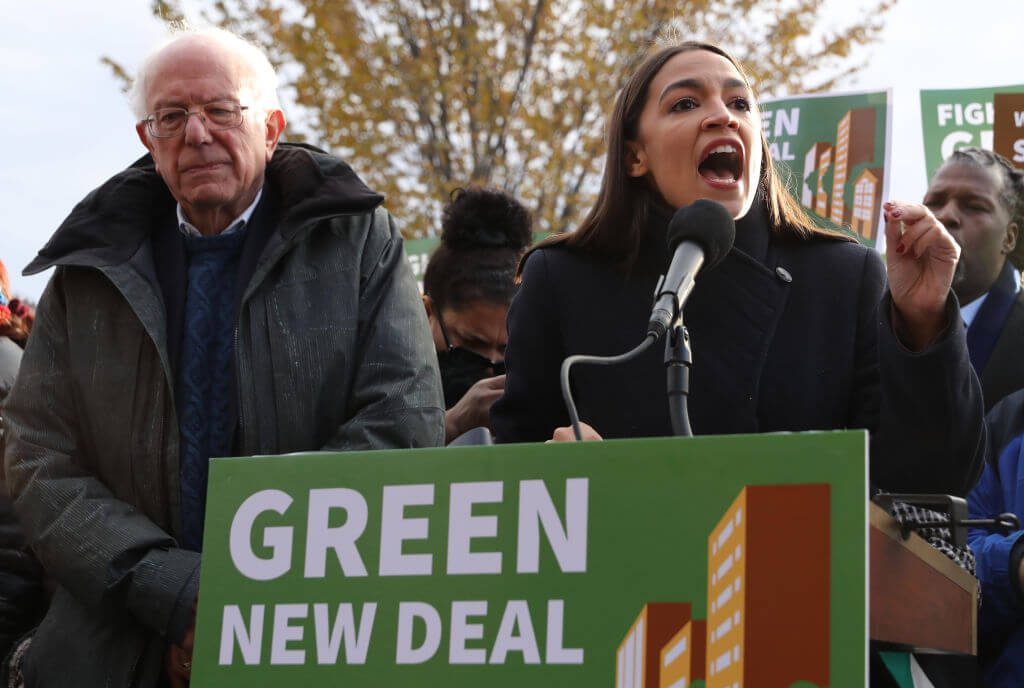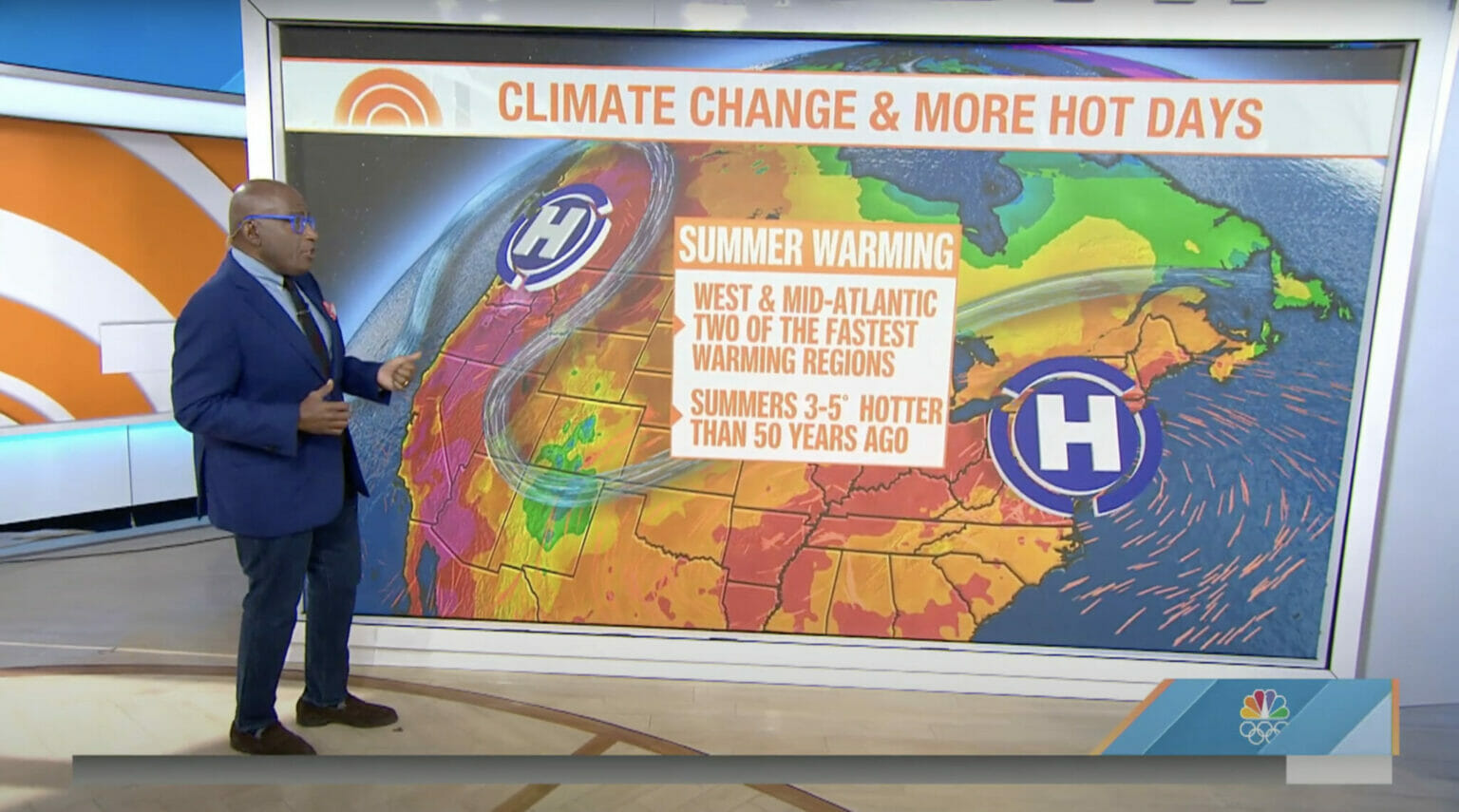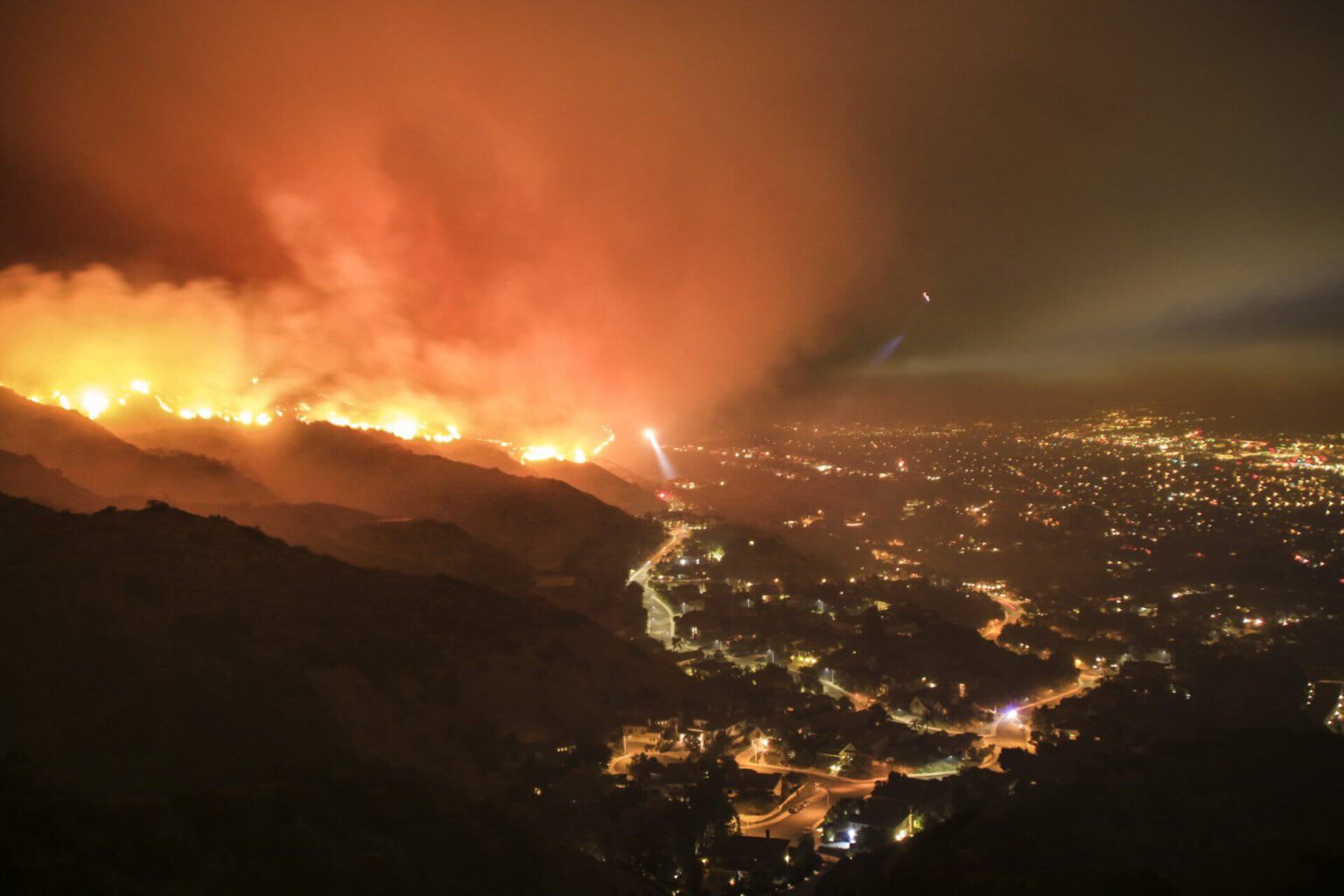Sign up for Climate on the Ballot, our new weekly newsletter with ideas for reporting on climate and the 2024 elections.
Earlier this month, WNYC’s Brian Lehrer interviewed New York representative Alexandria Ocasio-Cortez about the Green New Deal, the landmark resolution she and Massachusetts senator Ed Markey first introduced five years ago this month. Although the Green New Deal did not pass in its original form, Lehrer observed, many of its key elements resurfaced in the Inflation Reduction Act, which US president Joe Biden signed into law on August 16, 2022.
The most far-reaching climate legislation in US history, the IRA authorized at least $369 billion in federal spending to supercharge the nation’s transition away from fossil fuels. The law’s subsidies and tax credits have already created over 211,000 clean energy jobs and sparked $310 billion in new investments across the US — much of it in red states whose congressional representatives unanimously voted against the IRA (that has not stopped them from taking credit at ribbon-cuttings).
The Green New Deal was an ambitious climate agenda that spurred what Ocasio-Cortez called “everyday organizing from Americans,” and which laid the groundwork for the IRA. Despite Republican opposition and some foot-dragging by West Virginia Senator Joe Manchin, the climate legislation ultimately passed “in no small part thanks to the advocacy and… energy behind Green New Deal organizing,” Ocasio-Cortez told Lehrer. “[It] really was a driving force behind the Inflation Reduction Act.”
With Donald Trump, the frontrunner for the Republican presidential nomination, promising to “drill, baby, drill,” climate change is poised to become a defining issue of the 2024 elections, and not only at the national level. The IRA is the centerpiece of the Democrats’ and Biden’s climate record. Yet surveys show that the vast majority of Americans (71%) know almost nothing about it. Although pundits have blamed the White House for not communicating better, the record suggests that the media’s own lack of coverage of the IRA has also played a role.
The lack of news coverage is odd, considering what an audience-friendly story the IRA’s ongoing roll-out is. Local news outlets in particular have a golden opportunity to explore what the IRA has, and has not, achieved in their own communities. It’s a story full of compelling characters and great visuals, such as this newly hired employee at a Georgia battery storage facility, this local homeowner who used IRA funds to improve his home insulation, and how Mainers purchased so many heat pumps that the state upped its installation goals. For journalists focusing on elections, the IRA is also an opportunity to tie climate into your campaign reporting. For example: How did political candidates vote on the IRA? If they weren’t in office, what did they say about it? And what are their climate plans going forward?
When the Green New Deal was introduced five years ago, most mainstream news coverage said almost nothing about its actual contents; the focus was on the political ramifications, especially whether it made Democrats look “too far left.”
The political implications of any legislation are, of course, important. But for voters to make informed choices, they need first and foremost to understand the law’s substance: what it aims to do, how it aims to do it, and how well it is achieving those aims. The next nine months offer journalists plenty of opportunities to deliver that kind of coverage in time for Election Day.
From Us
ONE DAY LEFT: Apply now for the 2024 CCNow Awards! The deadline for entries for the fourth annual Covering Climate Now Journalism Awards is TOMORROW, March 1, at 11:59pm US Eastern Time. Journalism published or broadcast in 2023, anywhere in the world, in outlets big and small, is eligible. Apply now and please share the opportunity with your networks!
En español. The CCNow resource, “10 Climate Change Myths Debunked,” is now available in Spanish.
Noteworthy Stories
Climate at stake. Ahead of key elections this year, right-wing candidates in the US and the EU — two of the three biggest carbon emitters — are promising to undo climate policies, putting the energy transition at risk. “The growing hostility in some cases veers into outright climate denial and is part of a drift into authoritarian rhetoric that relies on attacks and emotional appeals more than traditional policy debate,” write Laura Millan, Zahra Hirji, Olivia Rudgard, and Jonathan Gilbert for Bloomberg…
- Climate policy is also being debated by US congressional candidates and others in states including Arizona, Montana, and Utah, writes Marcus Baram for Capital & Main…
Green jobs in red states. President Biden’s initiatives to jumpstart the clean economy are leading to growth in the manufacturing and mining sectors. Despite receiving little Republican support, two key climate laws driving the expansion of industries such as batteries and solar panels are expected to generate about 200,000 new jobs, mostly in Republican-leaning states. By Jennifer Hiller and Andrew Mollica at The Wall Street Journal…
Cheap EVs. The US government will need to support the Big Three automakers in the near term as Chinese car producers, in particular BYD, ramp up production of inexpensive electric vehicles, argues Heatmap’s founding executive editor, Robinson Meyer. BYD just launched an $11,000 plug-in hybrid, a price that Meyer says will spur US trade protections. Read his op-ed at The New York Times…
Big oil greenwashing. While Shell’s new startup, Onward, pledges to “advance the energy transition” much of its website content focuses on oil and gas production. Fossil fuel companies are investing in what appear to be solutions-oriented projects, but experts say they are mostly part of a bigger greenwashing strategy. By Molly Taft at Drilled and the Guardian…
Clean up your mess. Local citizens and global environmental groups are urging the Nigerian government to halt the sale of $2.4 billion in assets owned by Shell in the heavily polluted Niger Delta. They are demanding that Shell first resolve its environmental and social issues, including “the safe decommissioning of abandoned oil infrastructure,” before being permitted to divest in the region. By Taiwo Adebayo at the Associated Press…
Via Social
The Smokehouse Creek Fire in Texas, which started on Monday and has already burned over a million acres, making it the second-biggest wildfire ever in the US, could get worse in the coming days, CBS News reports. (See Climate Central’s wildfire facts and CCNow’s, “Making the Climate Connection.”)
Over 1 million acres have burned in record-breaking Texas wildfires — and relatively low humidities combined with warm temperatures could continue to fuel the destructive blazes, @WeatherChannel’s @JimCantore says. https://t.co/erkyeHXU3h pic.twitter.com/yQoxGb6oT2
— CBS Mornings (@CBSMornings) February 29, 2024
Resources, Reports, and Events
Carbon offsets. Global Investigative Journalism Network has a new reporting guide on investigating carbon offsets.
Snowfall. Climate Central has updated its “Snowfall Trends” package for reporters, which includes free, camera-ready graphics.
Climate pics. Clean Air Fund and Climate Visuals have launched a new collection of over 200 air pollution photographs that are free for use by the nonprofit, editorial, and educational sectors.
Deforestation. For the last decade, Global Canopy has reported annually on the deforestation policies and actions (or lack thereof) of the 500 companies and financial institutions “most exposed to deforestation risk.” While “pockets of progress” can be found, their latest report concludes that “voluntary action just doesn’t cut it.”
Microplastics. A new study published in the journal Environmental Science & Technology Letters finds that boiling and filtering tap water removes most microplastics from drinking water.
Dining out. A new report, “The Climate Reality for Independent Restaurants,” from the José Andrés’ Global Food Institute at George Washington University digs into the “immediate threats that the rapidly changing climate poses to independent restaurants, the millions of individuals they employ, and the farmers who supply them.”
Climate in Africa. Reuters Institute is holding a webinar, “On Africa’s untold climate change stories,” March 13. RSVP.
Climate conferences. Aspen Ideas: Climate runs March 11 – 13 in Miami, Fl. The International Journalism Festival in Perugia, Italy, includes a number of climate crisis sessions. April 17 – 21. Learn more.
Local Story Ideas
Stories on our radar that local journalists can consider for their own audiences:
- Report on how air quality is worsening locally due to climate conditions, which is the case in many communities, according to a new First Street Foundation report. Colorado Public Radio localized this news story by examining unhealthy air days in each county.
- Profile a college’s clean energy efforts, as Inside Climate News does in a report about the installation of a renewable-powered geoexchange system. In nearly all US states, colleges are taking climate action.
Jobs, Etc.
Jobs. Grist and Blue Ridge Public Radio are recruiting a regional reporter to cover Appalachia. The New York Times is hiring an energy correspondent. SciLine is hiring a local media outreach program associate.
Awards. Submissions are open for the Indigenous Journalists Association’s 2024 Indigenous Media Awards. Apply by March 8.
Grist 50. Nominations are open for Grist 50, the online magazine’s annual list of climate and justice leaders to watch across sectors, disciplines, and backgrounds. Nominations help the Grist team find untold stories of people making an impact in their field or community. Who should be on the 2024 list? Submit a nomination by March 11.
Grants. The Institute for Journalism & Natural Resources is looking for reporting projects that cover Indigenous Protected and Conserved Areas (IPCAs) in Canada, with a particular focus on marine areas. Apply by March 29.
Residency. Applications are open for a two-week residency with the Banff Centre for Arts and Creativity for writers of Literary Journalism focusing on environmental concerns in February 2025. Apply by October 2.


